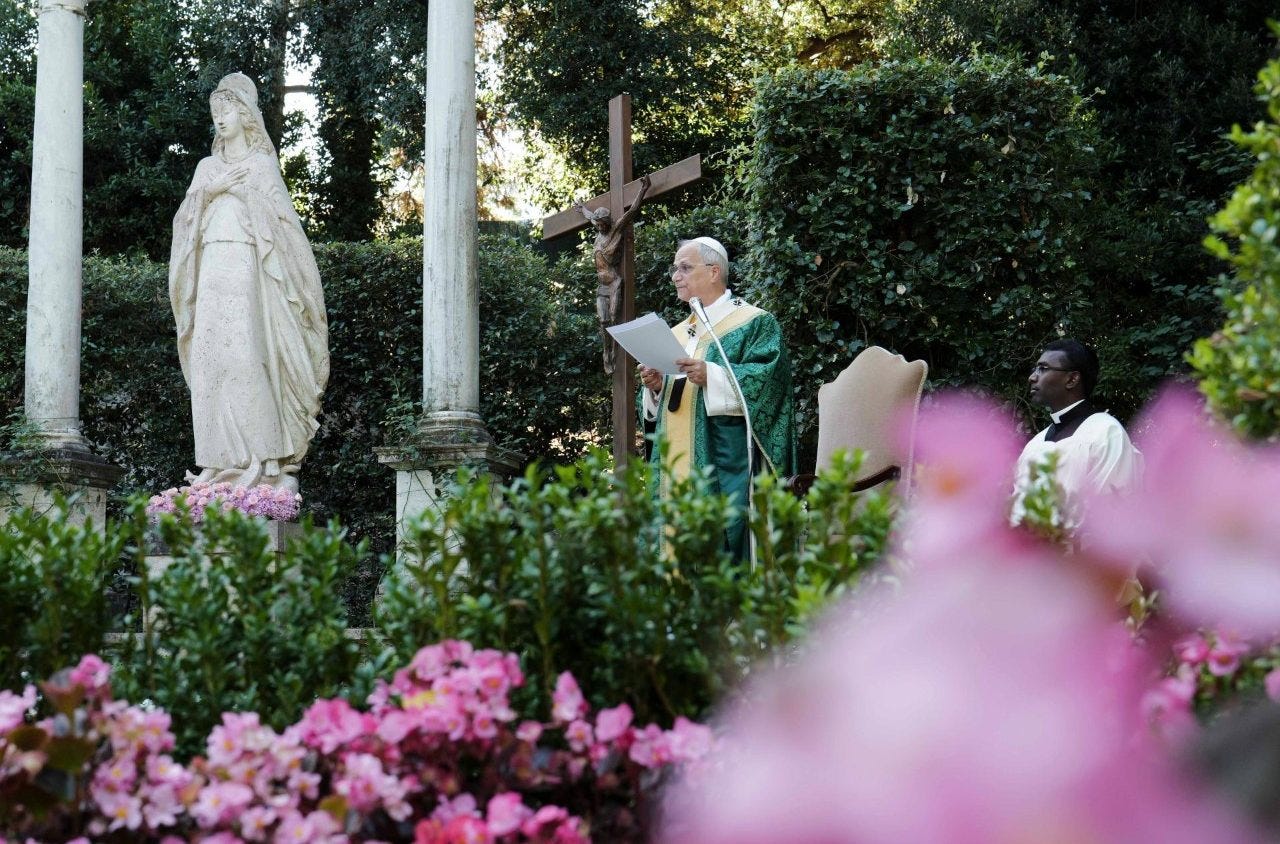At Church's First “Green Mass," Pope Warns Dire Threat of Climate Change
The pontiff prayed for the "conversion" of those "who still do not recognize the urgency of caring for our common home."

By Gary Gately
Pope Leo XIV delivered an urgent plea Wednesday to “hear the cry of the Earth” and combat the global climate crisis as he celebrated what has been dubbed the 1.4 billion-member Catholic Church’s first “green Mass.”
Leo celebrated the Mass in the lush gardens of Laudato Si’ Village, the ecological education center named for Pope Francis’ landmark 2015 environmental encyclical “Laudato Si’” (“Praise Be to You”), which condemned wealthy countries and multinational corporations for exploiting the Earth and its most vulnerable people for profit
About 50 staffers of the Laudato Si, on the grounds of the papal summer estate of Castel Gandolfo, and several cardinals attended the private Mass, in which Pope Leo lamented the “ecological crisis.”
“We must pray for the conversion of so many people, inside and out of the church, who still don’t recognize the urgency of caring for our common home,” the first U.S.-born pontiff said. “We see so many natural disasters in the world, nearly every day and in so many countries, that are in part caused by the excesses of being human, with our lifestyle.”
In the first two months of his papacy, the 69-year-old Leo has made clear that he intends to continue and build on Francis’ strong commitment to protecting the environment as a crucial moral imperative. Francis, the first pope from Latin America, made fighting climate change a cornerstone of his 12-year pontificate.
In his homily Wednesday, Leo — wearing flowing green vestments — repeatedly cited Francis’ Laudato Si'. “The message of Pope Francis is more relevant than ever,” Leo said. The Catholic Church, he added, must speak out about the urgency of confronting climate change “even when it requires the boldness to oppose the destructive power of the ‘princes’ of this world.”
Leo approved the new rite for the “Mass for the Care of Creation,” which becomes the 50th of special Masses the Church has developed over the centuries to pray for, among other things, countries, human labor, protection of civilians during conflicts and to invoke rain.
“At this time,” the Vatican decree for the new rite states, “it is evident that the work of creation is seriously threatened because of the irresponsible use and abuse of the goods God has endowed to our care.”
The day before the Vatican announced the new Mass, Leo published a dire warning in his message for the World Day of Prayer for the Care of Creation, which takes place September 1.
“Our earth is being ravaged,” Leo wrote. “On all sides, injustice, violations of international law and the rights of peoples, grave inequalities and the greed that fuels them are spawning deforestation, pollution and the loss of biodiversity. Extreme natural phenomena caused by climate changes provoked by human activity are growing in intensity and frequency….
“Yet, we seem incapable of recognizing that the destruction of nature does not affect everyone in the same way. When justice and peace are trampled underfoot, those who are most hurt are the poor, the marginalized and the excluded.”
Leo witnessed the toll of climate change on the poor and the vulnerable, in particular, when he served for years as a longtime missionary in Peru, where he spoke out repeatedly on the moral obligation to ensure climate justice.
On Wednesday, Leo opened his homily in the tranquil hilltop garden, overlooking Lake Albano, southeast of Rome, by saying: “We are celebrating in the beauty of a cathedral — one might call it a ‘natural’ one — with plants and so many elements of creation that have brought us here.”
But he quickly contrasted this “peaceful moment” with the terror of the disciples in the day’s Gospel as the seas raged in the storm.
“We can find ourselves precisely in this Gospel, which we have heard, observing the disciples' fear in the storm, a fear that is shared by a large part of humanity,” Leo said.
Jesus “still calms the storm,” not through power that overturns or destroys, but “gives new life,” Leo said, adding: “And we too ask ourselves: ‘Who then is this, that even the winds and the sea obey him?’ Our mission to protect creation, to bring peace and reconciliation, is his very mission — the mission the Lord has entrusted to us.
“We hear the cry of the earth, we hear the cry of the poor, because this cry has reached the heart of God. Our indignation is his indignation, our work is his work.”

